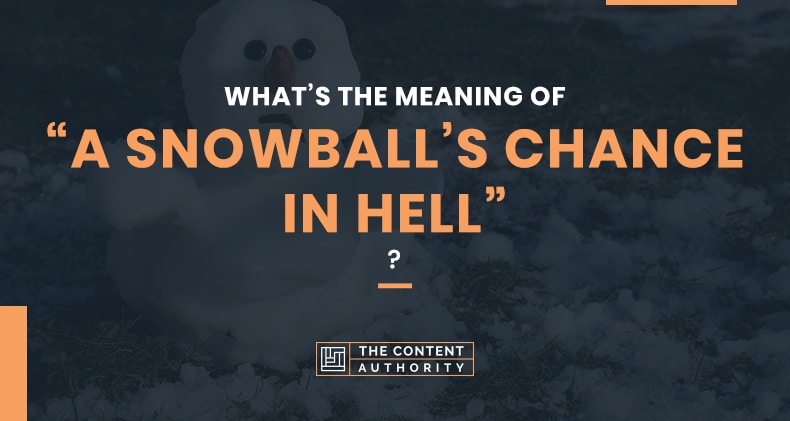When talking about events and incidences, people usually discuss “probabilities” and “possibilities” in the same vein. A “probability” is more in favor of a particular thing happening; a “possibility”, on the other hand, offers lesser hope. But when there’s zero promise, it’s referred to as “a snowball’s chance in hell”.
The phrase “a snowball’s chance in hell” means “almost zero possibilities” or “extremely slim chances” of a thing happening. A “snowball” is ice. “Hell” is imagined to be as “unbearably hot”. Something as cool as a snowball has zero chances of surviving in hell, which is the idiom’s inspiration.
If you’d like to know more about the idiom, its meaning, how it gets incorporated into various sentences, etc., read on.

“A Snowball’s Chance in Hell” – Definition
The idiom “a snowball’s chance in hell” means “impossible or extremely unlikely” or “no chance at all”. Not surprisingly, the phrase is typically used in negative contexts or statements or when one wants to say something on the lines of “it’s not happening even in your wildest dreams”.
If you dig further and try to understand how the idiom got conceived in the first place, it may do with a snowball’s supposed chances of surviving hell. “Hell” is an imaginary place assumed to be “extremely hot” or so scorching that a “snowball” will melt within a second or two of its stay in “hell”.
Though not common, the idiom can also be rephrased or slightly modified as “a snowflake’s chance in hell”.
Using the Idiom “A Snowball’s Chance in Hell” in Texts
As mentioned above, the idiom typically gets used in negative statements or a more discouraging tone. The phrase could also be used to bring to the notice of someone or something their “radical” or “foolish” thoughts or aspirations. If someone is trying to encourage someone, they are least likely to use the phrase.
The phrase can be incorporated into sentences in two ways. It could have a negative or positive verb before it. For example:
- She has a snowball’s chance in hell of making it to the final.
- She doesn’t have a snowball’s chance in hell of making it to the final.
Both sentences above pretty much mean the same thing. The first sentence may seem like it affords a slimmer of hope, but it doesn’t. A snowball will never have a chance of surviving in the sweltering conditions in hell.
That said, having “a snowball’s chance in hell” could be used in reference to events where there could be one in a million chance of succeeding, such as winning the jackpot on a lottery ticket.
Example Scenarios Where the Idiom Could Apply or Be Used
A 25-year-old has no job, is not actively looking to get employed, and spends most of his time on his couch watching TV, noshing on chips and cola. The guy aspires to become a millionaire before he becomes 30 years of age, which by itself is not a far-fetched goal by any means.
The problem is that the person is unwilling to give up his unhealthy eating habits and fascination for the couch and the TV. He is reluctant to bring about a drastic change in his lifestyle. Also, he’s got no vision or has no roadmap to attain his goal.
It’s safe to say the man doesn’t have a “snowball’s chance in hell” of realizing his dream.
Here’s another example. Hoping to make it to New York from Chicago by road in 4 hours is impossible. It doesn’t matter the vehicle you drive, the speed at which you move, how favorable the weather or the driving conditions are, etc.
There’s “a snowball chance in hell” of reaching New York from Chicago in such a short time. The only feasible option is taking a flight.
Is the Phrase “A Snowball’s Chance in Hell” Formal?
Like most idioms or expressions, “a snowball’s chance in hell” is also not acceptable in a formal writing scenario. It means it’s implausible to be used in business texts, academic essays, etc.
Idioms are usually not incorporated in formal texts as they come across as “inappropriate”, “offensive”, or “rude”. Also, unlike blog posts or an email message to a friend, standard texts are expected to be concise or get the point across in as few words as possible.

Since idioms are descriptive or elaborative, they tend to fall out of favor with writers who purely mean business.
Talking about the negative connotations attached to idioms, the phrase “a snowball’s chance in hell” could be perceived as “offensive” or “rude”. The term “hell” is usually considered hostile and commonly used in expletives, as in “Go to hell!”. Therefore, the idiom could get misinterpreted as swearing, especially if the speaker’s tone is aggressive.
It may not be easy to decipher the tone with texts, making it even more challenging for the writer not to get called out for “rudeness”.
Exceptions to the Rule
However, with most things in life, the idiom “a snowball’s chance in hell” could or may have been used in formal texts, such as books and newspapers.
The first documented usage of the idiom in a news publication was in April 1880 in The Detroit Free Press. The phrase was featured in an article that discussed the Republican National Convention, which was held in June the same year.
Though the exact page is not available or hard to find online, several other sites discussing the idiom’s origin provide the reference.
Another example was also from the 1880s (March 1884), when the phrase was used in the Las Vegas Daily Gazette. The article talked about how New Mexico’s people had “no chance in hell” to have a say in the laws proposed back then.
The phrase may have been used in news articles, journals, books, etc., after that sporadically or frequently. The above two mentions, however, are the earliest.
The 1880s saw the phrase getting established in news publications, with rephrased or variants of the idiom showing up in various other articles in the same newspaper and a few others too after that. Since “hell” has a strong negative connotation (as mentioned above), the term may have been replaced with a less harsh word.
It was essential to tone down the “harshness” or the “intensity” of the phrase a bit as it had to be used in reference to politicians, bureaucrats, etc., who could have quickly taken offense to the word and sued the concerned publication.
Here are a few example sentences (slightly rephrased) illustrating how the phrase was used in news articles after the initial two mentions:
- Norwood’s chances in the lower territories were akin to a snowball’s chances. (The Atlanta Constitution)
- Those keen on wrestling with the tiger have a snowball’s chance (in reference to gambling). (The Daily Inter Mountain)
- The bakery melted like snowballs in hell (denoting a fire accident). (The San Marcial Times)
- If you ask your friend to drink at a saloon other than the Commerical, he will disappear even more quickly than a snowball in hell. (The San Marcial Times)
- Ridin’ with that, a man cannot last any longer than a snowball in hell. (The Omaha Sunday Bee)
More Fun Idioms
Example Sentences with the Phrase “A Snowball’s Chance in Hell”
The following are sentences that employ the phrase in different ways or varied contexts:
- To be honest, there is not a snowball’s chance in hell that they’ll win the match.
- She is not getting the job. She does not have a snowball’s chance in hell.
- Your proposal is outlandish. It’s got a snowball’s chance in hell of getting approved.
- If she cannot hire a reasonable attorney, she has a snowball’s chance in hell of coming out victorious in the case.
- The boat does not have a snowball’s chance in hell in the hurricane. It’s going down for sure.
- The election candidate has a snowball’s chance in hell in that part of the region.
- Being a start-up comprising just three people, we’ve got a snowball’s chance in hell of defeating the megacorporation.
- He does not have a snowball’s chance in hell with getting that project done on time.
- She’s got a snowball’s chance in hell of scoring a dinner date with Leonardo DiCaprio, but she can continue to fantasize.
- You do not have a snowball’s chance in hell of reaching the airport for your flight in time.
- There is a snowball’s chance in hell of her wearing that outfit to prom.
- Without a coordinator, you’ve got a snowball’s chance in hell of making it as a model or even entering the field.
- There is not a snowball’s chance in hell she’ll go out with you for a date.
- There’s a snowball’s chance in hell of you winning the jackpot on that Italian lottery.
- We thought the team with its rookie line-up had a snowball’s chance in hell of winning the series against the star-studded squad. The relatively inexperienced side, however, proved us wrong.
- The scheme’s likelihood of getting the green is akin to a snowball’s chance in hell.
- The budget is almost certain to be in favor of the large corporations. It favoring the end consumer is a snowball’s chance in hell.
- There’s a snowball’s chance in hell that the venue will be ready for the games by next year.

Conclusion
Like most idioms, “a snowball’s chance in hell” need not be employed in texts verbatim or in its entirety. You may tweak, rephrase, shorten its length, etc., to suit your writing requirements or to ensure it fits and flows well in your sentences.
You may even cut the term “hell” for the reasons mentioned above. However, keep the word “snowball” in it each time you use the idiom, as editing it out is akin to not using the expression at all.
Shawn Manaher is the founder and CEO of The Content Authority. He’s one part content manager, one part writing ninja organizer, and two parts leader of top content creators. You don’t even want to know what he calls pancakes.

